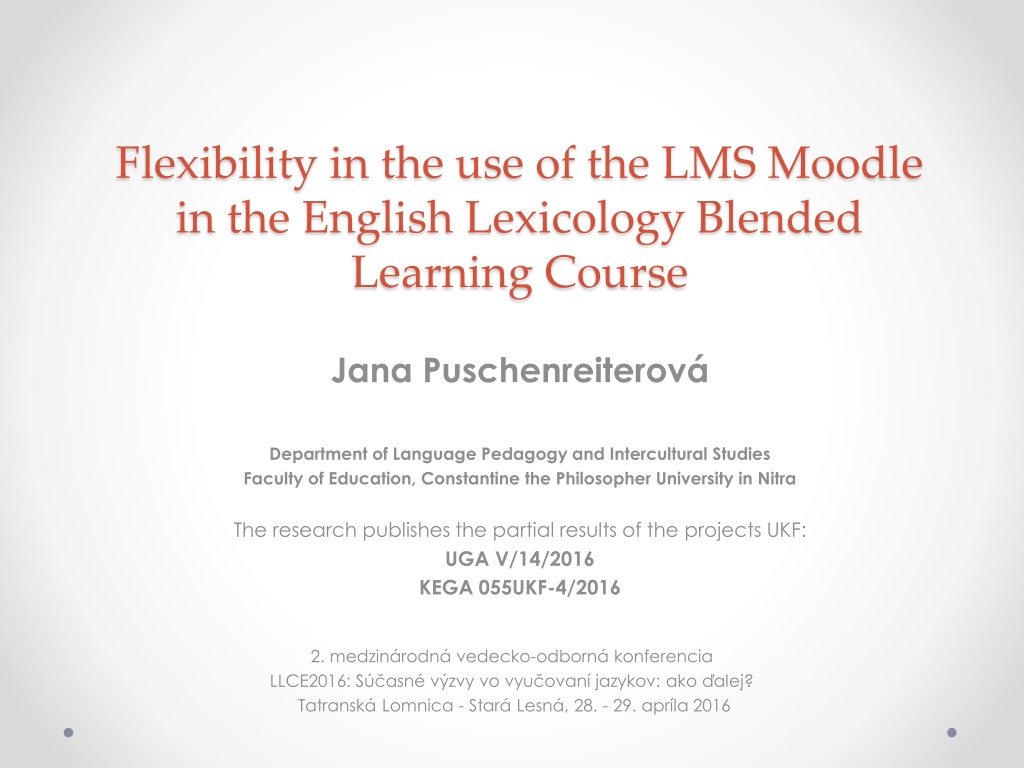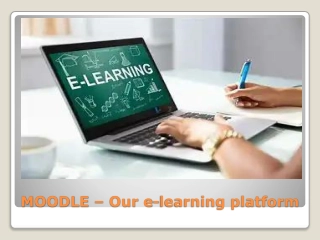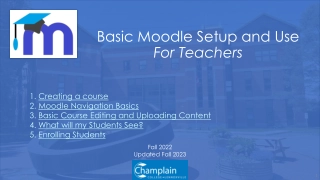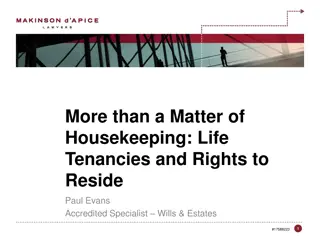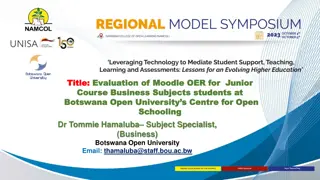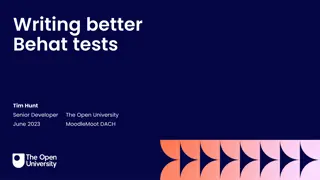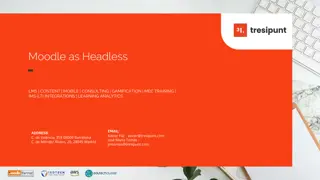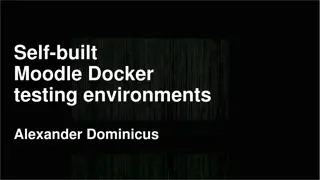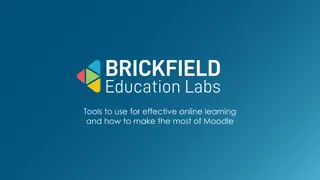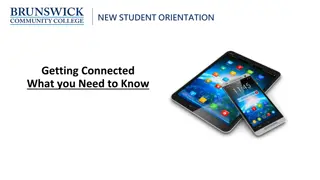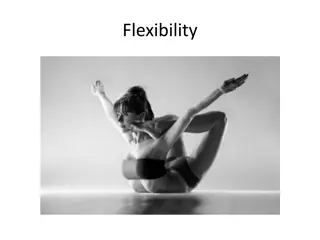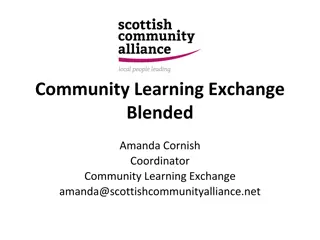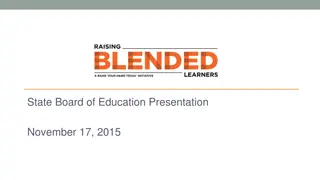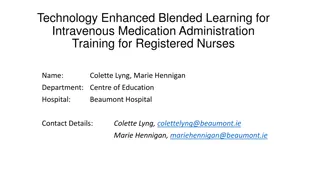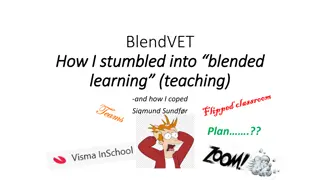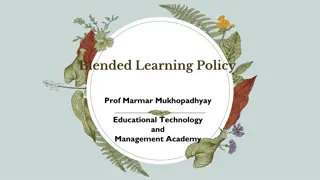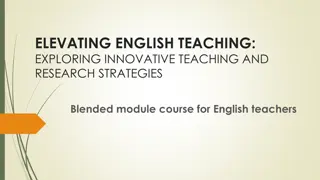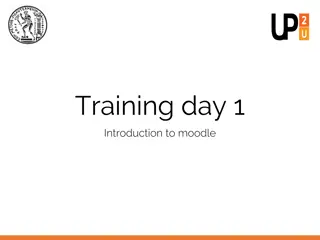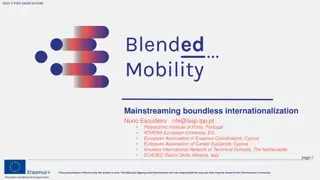Exploring Flexibility in Moodle for English Lexicology Blended Learning
Research by Jana Puschenreiterov delves into the use of LMS Moodle for English Lexicology in a blended learning course, emphasizing flexibility in time, place, and technology. The study investigates student preferences regarding study locations and devices. Potential applications of blended CALL are also discussed.
Uploaded on Oct 01, 2024 | 0 Views
Download Presentation

Please find below an Image/Link to download the presentation.
The content on the website is provided AS IS for your information and personal use only. It may not be sold, licensed, or shared on other websites without obtaining consent from the author. Download presentation by click this link. If you encounter any issues during the download, it is possible that the publisher has removed the file from their server.
E N D
Presentation Transcript
Flexibility in the use of the LMS Moodle in the English Lexicology Blended Learning Course Jana Puschenreiterov Department of Language Pedagogy and Intercultural Studies Faculty of Education, Constantine the Philosopher University in Nitra The research publishes the partial results of the projects UKF: UGA V/14/2016 KEGA 055UKF-4/2016 2. medzin rodn vedecko-odborn konferencia LLCE2016: S asn v zvy vo vyu ovan jazykov: ako alej? Tatransk Lomnica - Star Lesn , 28. - 29. apr la 2016
CALL (Computer Assisted Language Learning) Tab. 1 CALL in historical perspective (adapted from Vesel , 2012, p. 53)
CALL (Computer Assisted Language Learning) Ubiquitous learning Wheeler (2009): U-learning will rely heavily on access to devices and tools that enable and support learning in any context, whether mobile or static, anywhere 24/7, and in a manner that is seamless and unobtrusive. It will also need to be intelligent according to the strictest interpretation of the ubiquitous model, so that it can predict changing contexts and user needs as they occur. The key tools of U-learning will be mobile phones, laptops and other wireless devices.
Blended CALL Blended learning Blended CALL Potentials of blended CALL based on the ideas of U-learning Flexibility from the point of view of time, place and technological device used for study purposes LMS Moodle as an effective tool of technology integration at Slovak universities
Research on flexibility in an blended CALL English Lexicology course - partial results of the research within dissertation thesis Pitfalls and Potentials of Technology in Language Education Research aim: to investigate the issue of flexibility within blended CALL English Lexicology course Research questions: RQ1When did students study English lexicology with the use of an online course created in LMS Moodle? RQ2 What were the most preferred places of the students for studying English lexicology? RQ3 What was the most preferred technological device for studying English lexicology with the use of an online course created in LMS Moodle?
Research on flexibility in an blended CALL English Lexicology course Setting and participants: o 29 students participating in the study; divided into 2 groups within the English lexicology course. o winter term 2015/2016; i.e. 21. 9. 2015 - 19. 12. 2015 (13 weeks) o lecture on Tuesdays from 01:00 to 02:40 pm; then 2 seminars (i.e. 02:45 04:15 pm (18 students); 04:30 - 06:00 pm (11 students) o Blended CALL: face to face phase (lecture and 1/3 of the seminar) + CALL phase (2/3 of the seminar; students could either stay in a computer classroom or leave and do the assignments any time and place suitable for them) Research methods: Case study o Focus groups o Analysis of quantitative LMS Moodle records (i.e. records about the activities of the students in the e-learning course)
Results RQ1When did students study English lexicology with the use ofan online course created in LMS Moodle? Graph 1 Number of hits by students in days during week and holidays
RQ1When did students study English lexicology with the use ofan online course created in LMS Moodle? Graph 2 Number of hits by students (either posting or viewing the contents of the course) within each of the 24 hours during the day (within the entire term)
RQ2 What were the most preferred places of the students for studying English lexicology? Focus Groups Analyses: Category Flexibility Subcategory : Place used for working in LMS Moodle Codes No. of Examples ocurrences S: I like to work on the assignments at school only, I have plenty of time to work on them and I like to go home with the feeling that I have submitted Lexicology assignment. 1. Using of the S: I use the system at school only. I like to do and submit my assignments here [at school] and I do not have to do online course in 6 anything at home. ; school only (during seminars) S: I try to do everything at school because, actually, I am supposed to spend some time doing assignments, so why not to use the time devoted to it, and I like it because you are here and we can discuss things. 2. Using of the S: [ ] I do also other things at home, and while doing these things, I do my assignments. I just like to do things like that online course at at home, anytime I want. ; 7 home (or S: Me too, I like to do it at home, I have more time and I do it as I want. I have my privacy at home and, that noise at dormitory) only school, I do not like when the others are talking, so when I want to think more . S4: I usually submit my assignments at ten o clock pm., from the place I actually am at that time. S3: at the pub [sarcastically] 3. Other place (in a 3 S4: Yes, actually I submitted my assignment from the pub once, then from home, dormitory, and from the shopping train, bus, etc.) centre I especially liked the possibility to study anywhere and anytime. S: I try split my work at least into halves, somehow, I try to do as much as I can when I am at school and I finish it at home 4 Combination 13 S3: Well, I do most of the assignments at school, well, sometimes also at home. When I want, I do everything during the seminar and if not I finish [assignments] at home. S: I liked that we could work not only during the seminars but also anywhere and anytime we wanted.
RQ3 What was the most preferred technological device for studying English lexicology with the use of an online course created in LMS Moodle? Computer 27 occurrences in FG data despite the popularity of smartphones and tablets, computer was the most preferred technological device Tablet 1 occurrence in FG data Smartphone 2 occurrences (usually late submissions of the assignments)
Conclusions of the research Limitation: Case study Potentials belonging to the Flexibility category of CALL potentials were exploited by students as they completed and submitted the assignments from various places and technological devices. Exploiting the potentials emerging from flexibility strongly supports the ideas about ubiquitous learning. The blended CALL model of learning proper solution supporting learner-centred approach and autonomous learning.
Thank you for your attention
